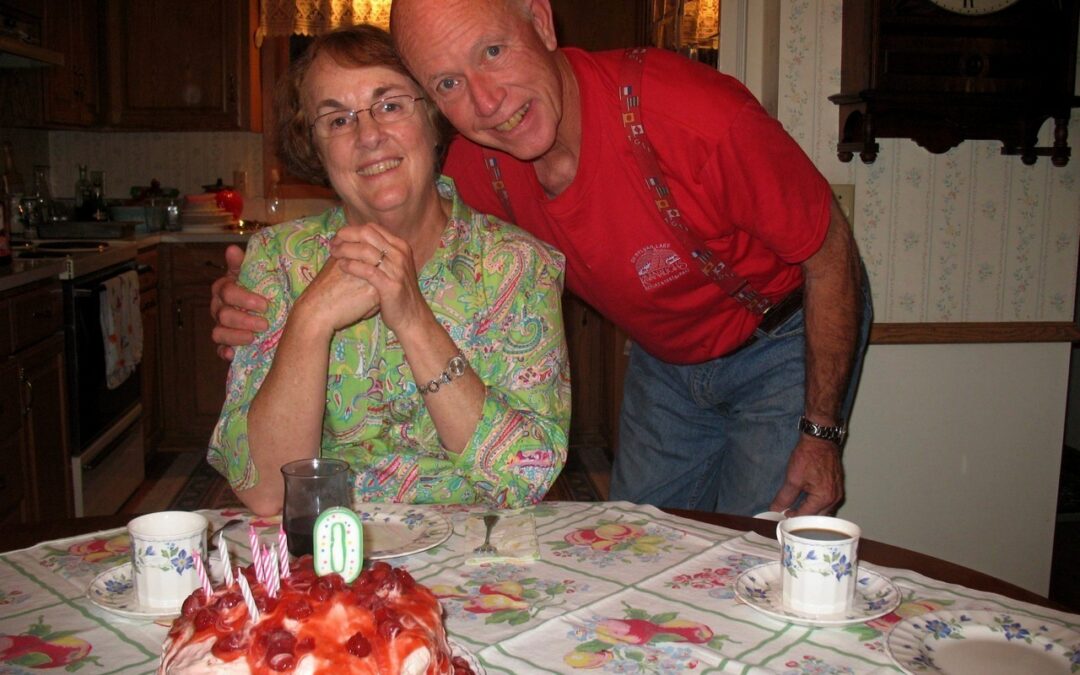(My mom and dad on Mom’s 70th bday)
I had the honor of speaking at the Sunrise Lions Club the other day, and after we got through the questions, someone mentioned a beloved former Lion named Al, who made it to 103 before he died this year. One of the members always picked him up in the morning to ensure he could attend the morning meetings. Another said she wore his vest to every meeting so he could still be there in spirit. A third member shared a story about how much Al loved his wife of 60 years, who, before she died, had been suffering from dementia and had moved into a nearby nursing facility. He would walk over to eat lunch with her, even though she didn’t recognize him or know he was her husband. One of his friends asked, “Al, why do you go every day? She doesn’t even know who you are anymore.” His answer: “But I know who she is.”
I love that story. It brought tears to my eyes when I heard it because I watched my dad do the same thing with my mom in the final months of her life. And I know all over the Quad Cities, there are hundreds of husbands, wives, daughters, sons, brothers and sisters getting up every day to be caregivers for someone they love who has dementia.
Did you know there are more than 100 different kinds of dementia? Just like cancer, which has seemingly endless variations depending on where it is in the body, dementia is a broad term covering more specific diseases like Alzheimer’s, Lewy body, vascular and frontotemporal, to name a few.
It’s hard to single out just one thing that makes dementia a horrible disease for a person you love to get. Until you’ve experienced it firsthand, it’s hard to imagine someone you have walked through life with for 60 years could one day forget not only you and all the things you’ve done together, but also your children and grandchildren and every familiar face they’ve ever known.
Like anyone with a terminal illness, some days are better than others. The definition of “a good day” changes as the months go by. A day might start well but make a screeching u-turn when the person you love begins “sundowning” and is sure you are a murderer, or are having a secret love affair with the neighbor, or are a terrible human for some made-up reason that seems real to them. If you’re lucky, after your loved one takes a nap or time goes by, they’ll reset back to the level you consider normal for them now and go on as if nothing happened, because they don’t remember it happening. You’ll shove the last few hours of stressful behavior into a locked compartment in the back of your mind and keep moving forward, because as a caregiver, you don’t have time to think much about how you’re feeling, you’re too busy dealing with the round-the-clock demands of caregiving.
This is one of the toughest and maybe most ironic parts about dementia. The person with it doesn’t remember the hard times and the things they’ve said and done that hurt your feelings and wear you down. You, on the other hand, remember everything, even though you know it’s the disease talking, not them.
I still remember taking my mom out for a coffee at Wild Iris. She looked at me and asked if we’d gone to high school together. It hurts to know your mother can’t quite put a finger on who you are to her, even though she senses you’re someone important to her and she’s happy to be in your company. All you can do is take a deep breath, smile, and ask her if she went to Roosevelt High School and let the conversation roll forward from there. And deep down, you know it’s only going to get harder. And it does.
I wish my story were unique. It’s not. I’ve met so many people in the last 10 years who have stories much tougher than mine. And sometimes we share a few funny ones too, because you can find humor in even the worst situations. What I’d like most of all is for these stories to disappear completely. Not because I’ve lost my memory, but because there’s finally a cure for dementia and no one has to watch someone they love slowly disappear.
This is why I’ll be at the Walk to End Alzheimer’s on Saturday, Sept. 28, in Prescott Valley, spending a few hours remembering the people we’ve lost to the disease while supporting the people who are still living with or caring for someone with dementia. I hope you’ll join us too, whether you’re walking for someone you’ve loved and lost, or someone you know or care for has Alzheimer’s. Or because you want your grandchildren to live in a world where no one forgets who they are and how much they love you.

